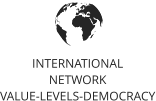© MARTIN BESECKE 2010 - 2025
ALL RIGHTS RESERVED.
WAS ICH TUE
ÜBER MICH
MEIN LEISTUNGSANGEBOT
FREUNDE & PARTNER
POLITIK & SYSTEM
NEUES & AKTUELLES
PUBLIKATIONEN
VORTRAG & DISKURS
BÜCHERTIPPS POLITIK
PROJEKTHISTORIE
RECHT & STRUKTUREN
JOHANNES HEINRICHS EDITION
STIFTUNG LEBENSPARK
KONTAKT
KONTAKT
IMPRESSUM
DATENSCHUTZERKLÄRUNG
A thought and research project!
INITIAL SITUATION
The current economic and interest-based monetary system led in its logical consequences to the mentality and ideology of the unconditional and
steady profit maximization.
But these enormous profits have led to redistribution also to our highly developed, modern communities with their very differentiated (civil) social
structures, especially civil societal-oriented infrastructures and to individual development opportunities.
And because communities are culture-building, which means that an already achieved level of development (and prosperity) also enters the
cultural-anthropological, then the clock can not be so easily turned back.
The people show no willingness to want to renounce in the long run on an already reached level of development, such as i.a. the examples
of Argentina, Iceland, Ecuador, Spain, Italy, Turkey, Venezuela and fundamental changes in the municipal codes in many US municipalities show.
Because of these system configurations, combined with the need to conserve and actually expand the communities, there is a constant need
to generate growth, with the well-known negative consequences of resource destruction, the need for overconsumption, environmental and climate
destruction, poverty and exploitation, indebtedness, the cutback of democracy, abuse of power, corruption, a negative socialization of the human
and also greed and the negation of morality and ethics.
Accurate differentiated analyzes of current alternative economic and monetary systems in conjunction with fairer redistribution mechanisms,
however, show clear signs that they can only slow down these inevitable negative developments at best, but can not prevent them or solve them
constructively.
But above all, they do not let recognize the value creation or profit opportunities that would be necessary to maintain and expand today's communities.
Moreover, all known economic and monetary theories, whether established or alternative, commit the fundamental error not to recognize and treat
the factor of money itself, as a material in remedy and socializing medium itself, in the expressions of speculation and bubbles and property
distributions as well as in the preservation and defense of property and thus also to consider the factor of reality of the human and to incorporate
accordingly into their own theory.
Instead, this whole complex of topics and these thematic contexts are simply left as non-existent, which additionally promotes the unsuitability of the
respective theories in practice.
Only Karl Polanyi has recognized and named the factor of reality of the human as well as the socializing effects of economic action on the human
in his analyzes of the economic and monetary system.
Taken together, this means the logical consequence that constructive, viable and sustainable system alternatives must be developed especially on the
basis of these cultural-anthropological and sociological contexts.
HYPOTHESIS
These analyzes and knowledges lead to the question of whether the true fundamental evil is not, that we give all things a monetary value?
As long as we measure all things with a monetary value, or at all with a fee, we are in fact forced, in the context of the need to preserve the
communities, to constantly make a profit, that is, to manage growth-oriented.
This constraint does not matter in which economic, money and redistribution system.
And this compulsion to profit-make-must, leads depending on the system design sometimes more, sometimes less, but always and inevitably
to the mentioned negative developments.
Even an interest-free monetary system in which the pricing and profit structures are freed of interest charges does not mean a solution to these
contexts and mechanisms of action.
This leads to the conclusion that the medium of money should be abolished completely and without substitution, if not necessary.
Replacement means in this context that there should be no more alternatives to the medium of money, no alternative payment systems with
alternative currencies and no exchange in any form, which would not be practicable in today's differentiated societies.
QUESTIONS / TOPICS
What would it mean if all goods, resources and services were available to all people free of charge in sufficient and necessary quantities?
What impact would that have on politics, society and the economy, and above all on research and development, if the medium of money were
no longer an instrument of exercising power and an investment-must and also of a means of exclusion?
Would the intellectual and intellectual abilities be free and available to develop alternatives to the current commodities and goods based on
fossil resources?
What does this mean for the development of alternative climate, environmental and resource-saving or renewable energy production?
Does a necessary inventiveness and innovation power basically remain?
What effects and significance does this have on the recognition, development, unfolding and promotion of individual abilities and talents
for the individual and thus for the society?
Will there then be enough "fulfilling" or even sufficient fields of activity (jobs), if it is then e.g. there will be no more competing companies
and large corporations for market share?
What does that mean for the enforcement and assurance of quality?
Is the man, without economic constraints, capable of recognizing and accepting his own natural limits and then being content with a
"merely" specific field of activity or a hierarchical level?
Will a society remain functional?
Will the necessary sense of responsibility develop, e.g. in the face of unattractive activities, when the medium of money as a means of disciplining
no longer exists?
To what extent is the man dependent on the medium of money, even in energetic contexts, as an incentive, reward and exchange system?
Is the money even necessary for these relationships?
Are resources actually being used responsibly, or is this really leading to a wastefulness mentality?
Will a responsible, sustainable and holistic way of seeing, thinking and acting develop in principle in the economy and society, if the medium of
money as a criminal and sanctioning instrument as well as a profit and investment context is missing?
What consequences does this have on the political system?
Will there be a greater cohesion and greater solidarity in the society due to a growing sense of equality?
Will democratic awareness be promoted and thereby further democratizing the political system?
Is money to understand and to explore as a culture-forming medium and thus also in cultural-anthropological contexts?
Is the man capable of giving up the medium of money or even of wanting to do so, especially with regard to his own self-esteem, competitive
and status thinking, as motivational and, above all, to the significance as a property factor?
What system elements in terms of content, legal, institutional and structural design must be introduced, taking into account reflection and
reconstruction mechanisms, in order to promote awareness and development for a world without money?
What are the legal bases for regulating of property issues?
(To illustrate, an everyday example: housing, housing distribution, protection and preservation of "own" living space.)
Five clear statements can be formulated without doubt:
Poverty, corruption, structures of power and domination in today's forms, especially economic, but also world and geopolitical,
as well as debt with all the associated negative effects and developments, it will then be in any case can not give.
Likewise the systemic conditions are created, that the today's economic system can change from a profit maximizing, as always with a
money system, with the necessity of the overconsumption, in a logical development to a pure demand-oriented system.
Initiator: Martin Besecke
Intermediate result - (as of August 2017)
One have to consider the medium of money as something that activates something deep inside of the human!
Most impressively, this can be observed in North Korea, where until the end of the 1990s there was no money at all, neither as a means of payment
nor as an alternative an instrument of exchange. North Korea practiced until then a pure distribution and allocation system.
Due to a very severe famine, were then allowed first markets and means of payment.
And immediately, all the known (capitalist) forms of expression showed up in the people, such as commercial thinking and acting, profit-oriented
thinking and acting, the propagation of property as well as consumption as an expression of wanting to be surrounded by things.
North Korea is therefore a perfect example of this because it was completely isolated and therefore the people there knew virtually nothing about the
outside world, what is there and how the things work.
And so they did not know until then that there is money at all, not what money is and what to do with it.
These expressions, which are directly shown, mean that for the initial thinking the conclusion must be drawn that in any case an exchange and reward
or recognition system for services rendered seems necessary for the social hygiene, because it corresponds to the inner, the universal sociality of the
human. Or to put it more precisely, one has to realize that the medium of money and above all the handling of it comes from the universal sociality
of the human.
This, in turn, means that in order to overcome the medium of money, people have to undergo an inner change of consciousness, a long process of
consciousness development.
And for this necessary work of consciousness, one has to think and work in a very differentiated way with the correct reflection and action-theoretical
approach.
In today's sociology, philosophy and political science is almost exclusively thought and worked in the context of the consciousness and the conscious-
ness development of the human with a false reflection-theoretical approach, namely: "The being determines the consciousness" or transferred to the
systemic, "The system creates and determines the consciousness ", or technically correctly expressed, is only thought and worked with the explicit
reflection!
This reflection-theoretical ‘understnding’ was formulated by Karl Marx, on which the communism / socialism is based, which was continued in the
"critical theory" and which also finds in the anthroposophy, in democracy concepts like the sole direct democracy and the council republic, in the
multiculturalism and in the "common welfare economy" or “economy for the common good”.
However, this approach is fundamentally wrong and, above all, impracticable in the systemic, because this approach even only the explicit reflection,
that is, only the normatively determined thinking and acting by the system can grasp and understand. Because the “explicit reflection” means in practice
the specification of explicit contents that the people should then develop into a certain ideal.
Marx has here the universal consciousness, that is, the deep inner, the universal sociality of the human with the by the system determined thinking
and acting confused and equated and not also the actual inner thinking of the people, the implicit reflection, so just the universal sociality of the human,
recognized and understood.
Therefore, this approach can not develop the people in their deep inner, in their universal sociality, which is why to this day all systemic designs based
on this approach have failed in practice or can only be maintained in the form of a dictatorship, just like North Korea i.a. in context with the medium
of money. But also Bhutan, which in the West in a transfiguring romanticization is often referred to as the luckiest country in the world, but that had
to allow on pressure of the population the television and the Internet and what then triggered an immediate run on these media. Or even Iran,
whose ideology assumes that an Islamic system automatically forms and develops the people to an Islamic human. As well as also the multiculturalism,
whose failure revealed itself in context with the so-called "refugee crisis" of 2015, because the insistence on the one’s own cultural identity and its
independence and autonomy also comes from the universal sociality of the human. And of course also the communism / socialism.
And the “common welfare economy” or “economy for the common good” sets the cooperation as an explicit target by implanting structures that force
a cooperative acting. This acting is not voluntary, not self-determined, but one is forced into these structures and has to act cooperatively believing
that thereby all human beings can be made into cooperative beings and the egoism thereby becomes eliminated, but which of course does not work
in practice, as has already been proven in larger companies.
All these systems have failed in practice and have not changed and evolved the people in their inner, because these systems just are based only on the
reflection-theoretic approach of the explicit reflection and this approach just does not can recognize, grasp and work with the universal sociality of the
human. - (By the way: Marx also wanted to abolish the medium of money.)
Because the actual inner thinking, the implicit reflection, is something completely different than the normatively determined thinking and acting by the
system. The implicit reflection is the expression of the deep innner, the universal sociality of the human! Whose, what is going on inside the human
in terms of communication and reflection, namely in the positive and in the negative, the interpersonal communication and reflection.
That is why, for example, the capitalism, as an expression of the economic interaction with each other, is so successful in its spread and persistence
because it even comes from the universal sociality of the human and represents a direct expression of the interpersonal communication and reflection.
Hegel was the first to recognize the sociality of the human and to formulate a first reflection-theoretic approach, the explicit reflection.
However, Hegel, so to speak, stopped halfway by recognizing and postulating only the explicit reflection, whereupon Karl Marx then referred with his
reflection-theoretical understanding, but did not fully understand it, which led to the misunderstanding already described.
Because a reflection-theoretical approach, which refers only to the explicit reflection, that is, only working with explicit targets, can not fully grasp
the actual universal sociality of the human and even less work with it.
Johannes Heinrichs recognized this and further developed this approach to his reflection and action theory of the social, which also grasp the implicit
reflection that is crucial and absolutely necessary in order to recognize the universal sociality of the human and to work with it.
Because just in the systemic the implicit thinking can very well differ from the explicit, so from the normatively determined thinking and acting by the
system and does that also frequently.
In summary, it can be formulated as an intermediate result that the medium of money and above all the handling of it comes from the deep inside of
the human and thus represents an expression of his universal sociality and that in all his forms of expression, even the negative kind.
And it has to be experienced and explored in the same way as i.a. even the patriarchy first had to be experienced in order to be able to recognize it
and then to be able to fathom it and that also comes from the universal sociality of the human.
Because nothing can hold itself in the negative for centuries to millennia, if it does not come from the universal sociality of the human.
And because of the analysis formulated at the outside and for the necessary overall human development, it must be overcome by the humanity in the
same way as i.a. also the patriarchy must be overcome.
And that will only be able to work through an intensive awareness work, which must build on the experiences made so far and must be additionally
supported by a system that is based in its design on a reflection and action theory that the universal sociality of the human can grasp and fathom them
in the positive and then work with them in the positive.
Furthermore, this system must constructively give people the necessary means of expression and guarantee them, especially in human developments.
The Four-segmentation, the Value-levels-democracy is the only system to date that creates and guarantees these basic conditions.















